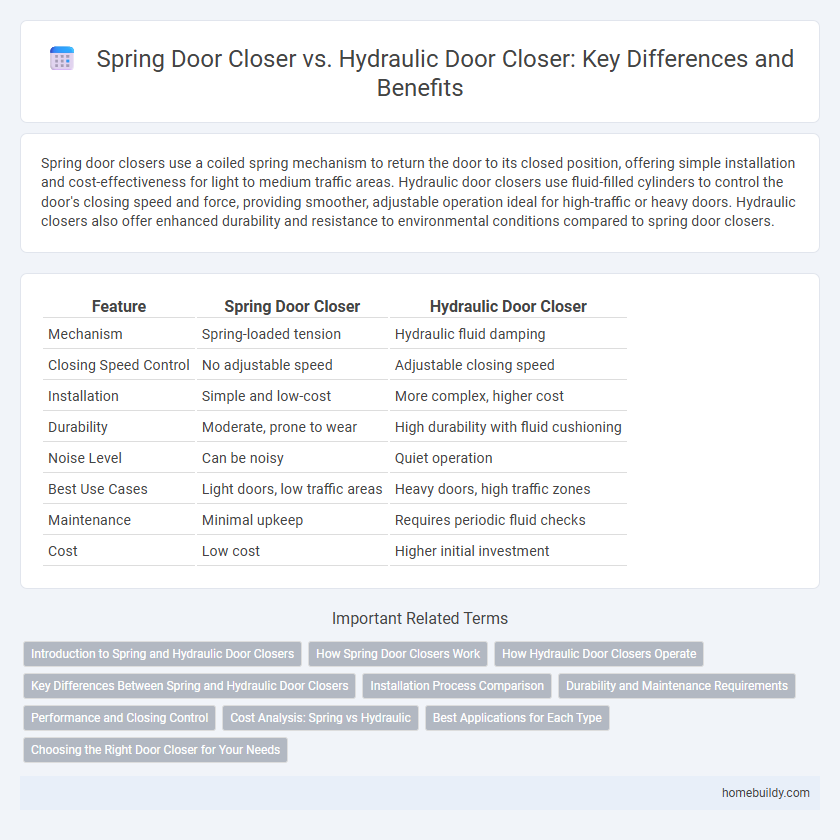Spring door closers use a coiled spring mechanism to return the door to its closed position, offering simple installation and cost-effectiveness for light to medium traffic areas. Hydraulic door closers use fluid-filled cylinders to control the door's closing speed and force, providing smoother, adjustable operation ideal for high-traffic or heavy doors. Hydraulic closers also offer enhanced durability and resistance to environmental conditions compared to spring door closers.
Table of Comparison
| Feature | Spring Door Closer | Hydraulic Door Closer |
|---|---|---|
| Mechanism | Spring-loaded tension | Hydraulic fluid damping |
| Closing Speed Control | No adjustable speed | Adjustable closing speed |
| Installation | Simple and low-cost | More complex, higher cost |
| Durability | Moderate, prone to wear | High durability with fluid cushioning |
| Noise Level | Can be noisy | Quiet operation |
| Best Use Cases | Light doors, low traffic areas | Heavy doors, high traffic zones |
| Maintenance | Minimal upkeep | Requires periodic fluid checks |
| Cost | Low cost | Higher initial investment |
Introduction to Spring and Hydraulic Door Closers
Spring door closers use a mechanical spring mechanism to automatically close doors by releasing stored energy, offering a cost-effective and low-maintenance solution ideal for light to medium traffic areas. Hydraulic door closers employ fluid-filled cylinders to control door closing speed and force, providing smooth, adjustable operation and enhanced durability suited for high-traffic commercial settings. Choosing between spring and hydraulic door closers depends on factors like door size, usage frequency, and desired closing control precision.
How Spring Door Closers Work
Spring door closers operate by using a tightly wound metal spring inside the device that stores mechanical energy when the door is opened, which then slowly releases to pull the door shut. This mechanism relies on the tension of the spring to control the speed and force of the closing action without requiring external power. Unlike hydraulic door closers that use fluid to regulate movement, spring door closers are typically more durable and simpler in design, making them ideal for lighter doors and less demanding environments.
How Hydraulic Door Closers Operate
Hydraulic door closers operate using fluid-filled cylinders that control the door's closing speed and force through adjustable valves. Unlike spring door closers that rely solely on mechanical tension, hydraulic closers use viscous fluid to ensure smooth, consistent motion and reduce slamming. This mechanism provides precise control over door movement, enhancing safety and durability in high-traffic areas.
Key Differences Between Spring and Hydraulic Door Closers
Spring door closers rely on a mechanical spring mechanism to control the door's closing speed and force, making them simple and cost-effective for moderate usage. Hydraulic door closers use fluid pressure to provide smoother, adjustable, and more controlled closing actions, ideal for heavy-duty or high-traffic doors. Key differences include the precision of closing control, durability under frequent use, and installation complexity, with hydraulic models offering greater customization and longevity.
Installation Process Comparison
Spring door closers typically have a straightforward installation process, requiring only basic tools to mount the tension spring mechanism onto the door and frame. Hydraulic door closers involve a more detailed setup, as they need precise adjustment of the fluid dampening system and secure attachment of the hydraulic arm for optimal door control. Both types demand proper alignment to ensure smooth operation, but hydraulic models often require professional calibration to balance closing speed and force accurately.
Durability and Maintenance Requirements
Spring door closers typically offer higher durability due to their simpler mechanical design, requiring less frequent maintenance compared to hydraulic door closers. Hydraulic door closers, while providing smoother and more controlled closing action, demand regular inspection and occasional fluid replacement to prevent leaks and maintain performance. The robust construction of spring door closers makes them ideal for high-traffic areas where minimal upkeep is essential.
Performance and Closing Control
Spring door closers rely on mechanical tension to return doors to a closed position, offering consistent performance suitable for lighter or interior doors. Hydraulic door closers use fluid dynamics to regulate the door's closing speed and force, providing superior control and smooth operation, especially for heavier or exterior doors. The hydraulic mechanism allows for adjustable closing speed and latching action, delivering precise performance that minimizes door slamming and enhances safety.
Cost Analysis: Spring vs Hydraulic
Spring door closers typically feature lower upfront costs due to simpler mechanical components, making them a cost-effective choice for budget-conscious installations. Hydraulic door closers incur higher initial expenses because of their complex fluid dynamics and adjustable features, but they offer enhanced durability and smoother operation that can reduce long-term maintenance costs. Evaluating total cost of ownership involves balancing the initial investment of hydraulic models against potential repair expenses of spring door closers in high-traffic environments.
Best Applications for Each Type
Spring door closers are best suited for lightweight interior doors, providing consistent closing force without the need for complex adjustments, ideal in residential or low-traffic commercial settings. Hydraulic door closers excel in high-traffic areas or heavy doors, offering adjustable closing speed and cushioning to prevent slamming, making them perfect for office buildings, hospitals, and public spaces. Choosing between the two depends on door weight, traffic frequency, and desired control over door movement.
Choosing the Right Door Closer for Your Needs
Spring door closers use mechanical springs to control door movement and are ideal for budget-friendly installations with moderate traffic. Hydraulic door closers provide smoother, adjustable closing speeds and enhanced control, making them suitable for high-traffic or commercial environments requiring precise operation. Selecting between spring and hydraulic models depends on factors like door weight, frequency of use, and desired control over closing force and speed.
spring door closer vs hydraulic door closer Infographic

 homebuildy.com
homebuildy.com